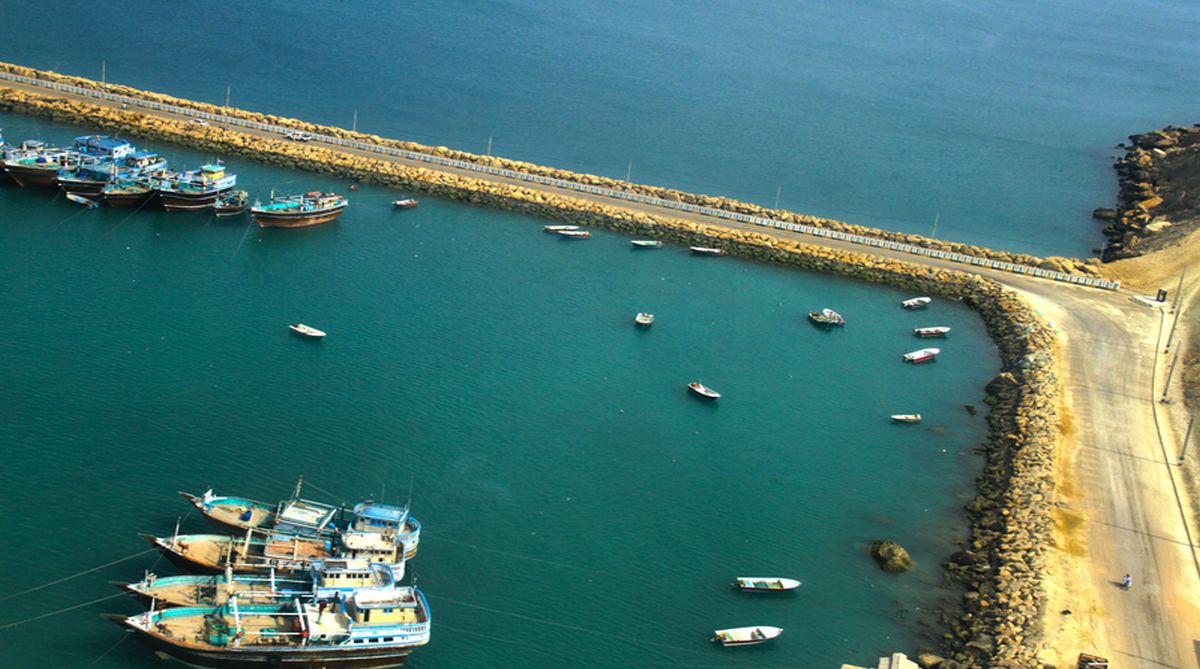As tempers flared in Washington…
Donald Trump and his Vice President JD Vance together targeting Ukrainian President Volodymyr Zelenskky in full media glare is a spectacle not witnessed in years.
The US had told India and other countries to cut oil imports from the Gulf nation to ‘zero’ by November 4 or face sanctions.

Chabahar Port is of great international significance in terms of trade, especially for India. (Photo: Wikimedia Commons)
The United States has exempted India from the imposition of certain sanctions for the development of the strategically-located Chabahar port in Iran, along with the construction of the railway line connecting it with Afghanistan.
The decision by the Trump administration, which a day earlier imposed the toughest ever sanctions on Iran and is very restrictive in giving exemptions, is a seen as a recognition by Washington of India’s role in development of the port on the Gulf of Oman, which is of immense strategic importance for the development of war-torn Afghanistan.
Advertisement
“After extensive consideration, the Secretary (of State) has provided for an exception from imposition of certain sanctions under the Iran Freedom and Counter-Proliferation Act of 2012, with respect to the development of Chabahar port, construction of an associated railway and for shipment of non-sanctionable goods through the port for Afghanistan’s use, as well as the country’s continued imports of Iranian petroleum products,” a State Department spokesperson told PTI.
Advertisement
The US on Monday imposed “the toughest ever” sanctions on a defiant Iran aimed at altering the Iranian regime’s “behaviour”.
The sanctions cover Iran’s banking and energy sectors and reinstate penalties for countries and companies in Europe, Asia and elsewhere that do not halt Iranian oil imports.
US President Donald Trump earlier on Monday defended his decision to give temporary exemptions to eight countries, including India and China, from the ban on Iranian oil imports, saying it was done so to keep global oil prices down and avoid causing a shock to the market.
When asked about his decision to give temporary exemptions to eight countries from the ban on Iranian oil imports, President Trump said, “I’m not looking to be a great hero and bring it down to zero immediately. I could get the Iran oil down to zero immediately, but it would cause a shock to the market. I don’t want to lift oil prices.”
“If you notice, oil prices are going down very substantially, despite the fact that already half of their capacity is gone. But I don’t want to do that,” he said.
Secretary of State Mike Pompeo said that eight countries — India, China, Italy, Greece, Japan, South Korea, Taiwan and Turkey — were temporarily allowed to continue buying Iranian oil as they showed “significant reduction” in oil purchase from the Persian Gulf country.
To a question on the fate of Chabahar port after the US reimposed all its sanctions on Iran, the spokesperson said, “This exception relates to reconstruction assistance and economic development for Afghanistan. These activities are vital for the ongoing support of Afghanistan’s growth and humanitarian relief.”
In May 2016, India, Iran and Afghanistan had inked a pact which entailed the establishment of Transit and Transport Corridor among the three countries using Chabahar Port as one of the regional hubs for sea transportation in Iran, besides multi-modal transport of goods and passengers across the three nations.
Mike Pompeo’s decision to give India an exemption from the imposition of certain sanctions for the development of the port is driven by the South Asian strategy, which was announced by President Donald Trump in August. It states that India has a major role in bringing peace and development in Afghanistan.
“The president’s South Asia strategy underscores our ongoing support of Afghanistan’s economic growth and development as well as our close partnership with India,” the state department spokesperson said.
“We seek to build on our close relationships with both the countries as we execute a policy of maximum pressure to change the Iranian regime’s destabilising policies in the region and beyond,” the spokesperson added.
In May, President Trump had pulled the US out of the 2015 landmark JCPOA terming it as “disastrous”. Under the Obama-era deal, involving five permanent members of the UN Security Council and Germany, Iran had agreed to stop its nuclear programme in exchange for relief from economic sanctions.
After the US’ withdrawal from the deal, Trump signed fresh sanctions against Iran, which claims its nuclear programme is peaceful and for civilian purpose.
The US had told India and other countries to cut oil imports from the Gulf nation to “zero” by November 4 or face sanctions.
Iran’s biggest oil customers – all in Asia – have been seeking sanctions waivers to allow them to still buy some of its oil.
India last week had said that it was engaged with the US, Iran and other stakeholders on the issue of American sanctions on the import of Iranian oil, amid indications that the Trump administration may grant New Delhi waiver from punitive measures.
(With agency inputs)
Advertisement